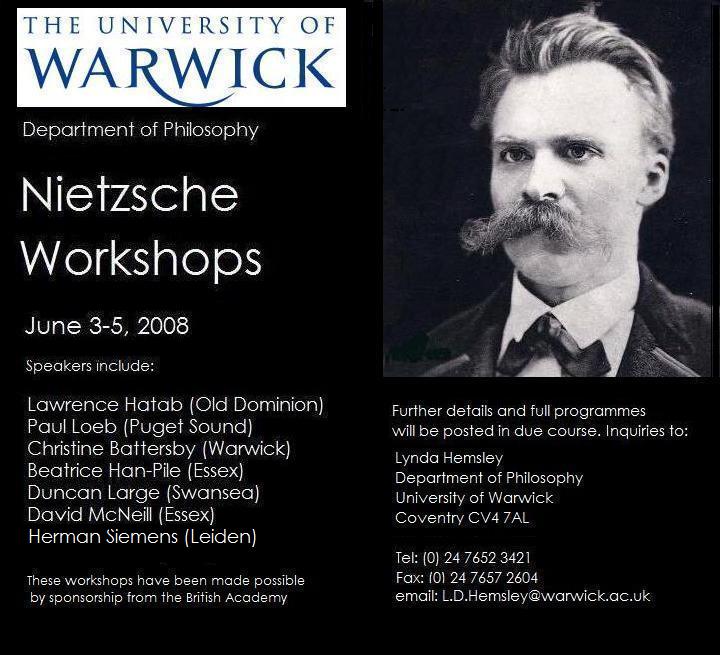搜索结果: 1-15 共查到“哲学 Nietzsche”相关记录15条 . 查询时间(0.156 秒)
Generosity as a central virtue in Nietzsche's ethics
Generosity as a central virtue Nietzsche's ethics
2015/7/29
Nietzsche's ethics is basically an ethics of virtue. In his own unique way, and in accordance with his extra-moral view of life, Nietzsche recovers and re-appropriates certain virtues – notably pagan,...
Nietzsche,immortality,singularity and eternal recurrence
Nietzsche immortality singularity eternal recurrence
2015/7/29
Joan Copjec has shown that modernity is privy to a notion of immortality all its own – one that differs fundamentally from any counterpart entertained in Greek antiquity or the Christian Middle Ages. ...
弗里德里希·威廉·尼采(Friedrich Wilhelm Nietzsche,1844—1900)
弗里德里希·威廉·尼采 Friedrich Wilhelm Nietzsche,1844—1900 湖州师范学院 德国著名哲学家
2014/6/26
弗里德里希·威廉·尼采(Friedrich Wilhelm Nietzsche,1844—1900),德国著名哲学家,唯意志主义的主要代表,同时也是卓越的诗人和散文家。他最早开始批判西方现代社会,然而他的学说在他的时代却没有引起人们重视,直到20 世纪,才激起深远的调门各异的回声。后来的生命哲学,存在主义,弗洛伊德主义,后现代主义,都以各自的形式回应尼采的哲学思想。

德国哲学家弗里德里希•威廉•尼采(Friedrich Wilhelm Nietzsche)(图)
德国 哲学家 弗里德里希• 威廉• 尼采 Friedrich Wilhelm Nietzsche
2013/1/7
德国哲学家弗里德里希•威廉•尼采(Friedrich Wilhelm Nietzsche)。
Nietzsche has a problem with the past. He thinks we all have a problem with it, indeed several interlocking problems, whose chief root he tries to identify. His repeated attention to this topic, comin...
It’s well known that Nietzsche expresses both positive and negative views about freedom. Both, indeed, turn important wheels in his philosophy. His denials of the possibility or coherence of free wi...
This article examines the place of religion in Nietzsche’s writings and how it fits
with the task of a “new philosopher.” Although Nietzsche opposes all otherworldly,
monotheistic religions, it is i...
Nietzsche on Religion, Metaphysics and the Contemporary World
Metaphysics the Contemporary World
2008/8/18
To address the various themes of this conference my paper, Nietzsche on Religion, Metaphysics and the Contemporary World will analyze the following quotes by Nietzsche:
[1] [“The Chinese … seem...
Within a few years of his death in 1900, Friedrich Nietzsche was widely recognised as a thinker and writer of genius, a devastating critic of religion, an acute diagnostician of the cultural ills of E...
To talk about Heidegger’s reading of Nietzsche, it is important to note that Heidegger does not merely refer to Nietzsche (as a symbol) and that Heidegger does not simply quote Nietzsche but and in th...
On Thinking Nietzsche as a Philosopher, On Reading Heidegger as Poet
Philosopher Poet Nietzsche
2008/8/14
To call Nietzsche a philosopher, rather than a poet or poet-philosopher, and, indeed, to say of him, as Heidegger did, that Nietzsche knew “what philosophy is,”[1] says a great deal. For it counters ...

The Department of Philosophy at the University of Warwick has a long-standing commitment to Nietzsche-studies and its promotion. It is pleased to announce details of two further workshops on Nietzsch...

The Friedrich Nietzsche Society was founded in 1990. Its aim is to promote the study of the life, work and influence of Friedrich Nietzsche. The Society currently has around 200 members in the UK and ...
Nietzsche's Ecce Homo - A Centenary Conference (London, 27-28 November 2008)
Nietzsche Centenary Conference
2008/6/16
Thursday, 27 - Friday, 28 November 2008
Venue: Stewart House/Senate House, Malet Street, London WC1E 7HU
Co-Ordinators:
Professor Duncan Large (Swansea) and Dr Nicholas Martin (Birmingham)
...

Aus den Vorlesungen "Über Vernunft und Existenz"
Gehalten 1935 an der Universität Groningen (Holland)NT
Die geschichtliche Bedeutung Kierkegaards und Nietzsches
Einleitend möcht...

